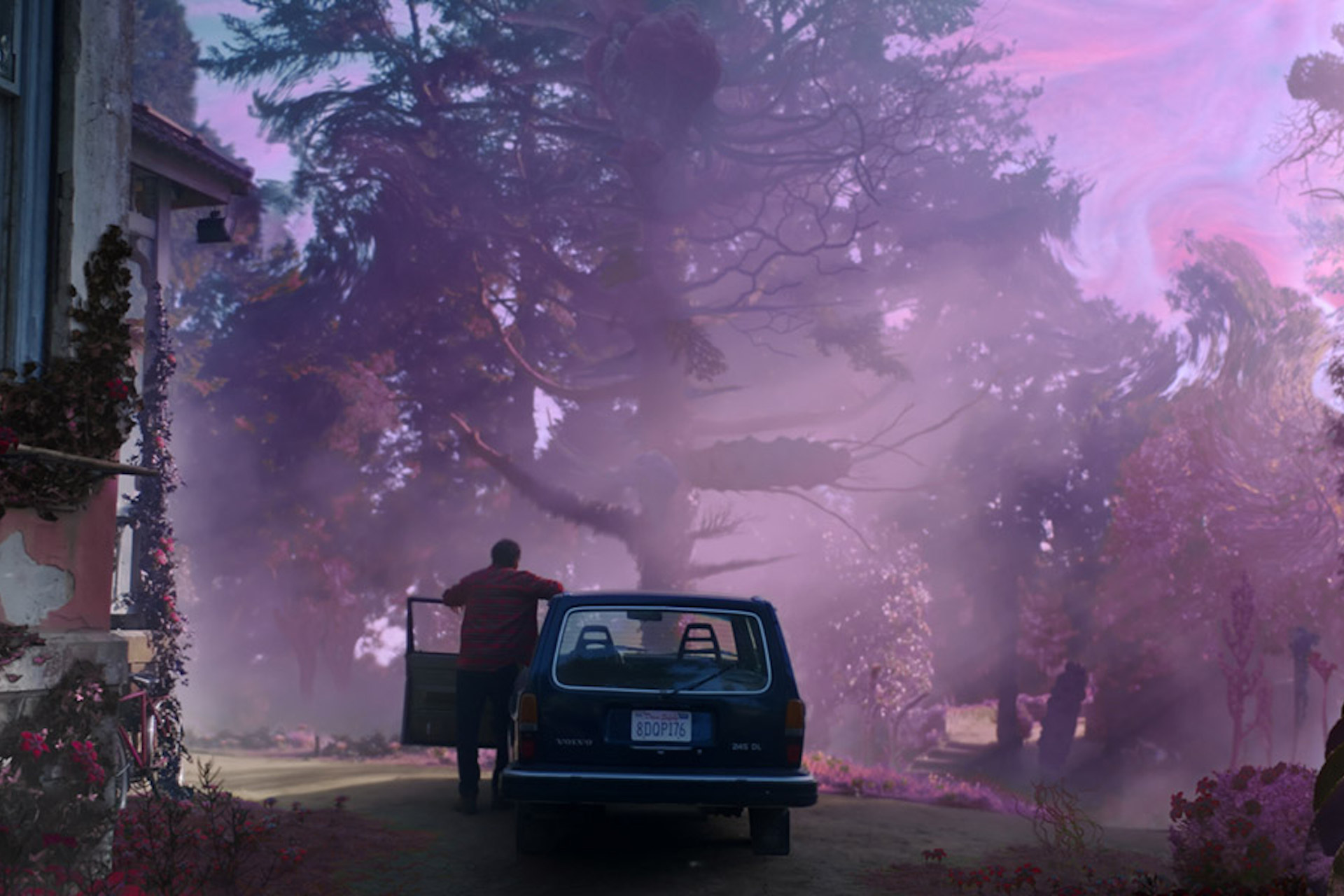
“It was just a colour out of space—a frightful messenger from unformed realms of infinity beyond all Nature as we know it; from realms whose mere existence stuns the brain and numbs us with the black extra-cosmic gulfs it throws open before our frenzied eyes.”
So ends H.P. Lovecraft’s “The Colour Out of Space,” a story that exists as more of a record than anything else. A record of what? A time and place that does not exist, but feels as real as it does mystical. Richard Stanley’s adaptation of this story, his first film in over two decades, instead dives a little deeper than treating the story as hearsay.
West of Arkham, within the woods and next to a reservoir, lies the farm of Nathan Gardener (Nicolas Cage) and his family: his wife, Theresa (Joely Richardson), daughter Lavinia (Madeleine Arthur), and sons Benny (Brendan Meyer) and Jack (Julian Hillard). Stanley takes his sweet time building these individuals up, rather sincerely painting a portrait of a loving family somewhat at odds with each other in a space that’s isolated and laden with obstacles (from dealing with life after cancer to milking and feeding alpacas).
Upon the arrival of what looks like a meteorite in the backyard, oddities begin invading the Gardner household. Time goes missing, odd flowers bloom, animals start acting strangely, bodies malfunction and decay; all because of a rock meant to display “shining bands unlike any known colours of the normal spectrum.” This being a film rather than Lovecraft’s story, where words can create an image beyond capture, Stanley settles for an ethereal pink fuchsia that permeates everything in sight.
It’s fascinating to witness how Richard Stanley creates a unique world out of Lovecraft’s words It’s one thing to make a Lovecraft-inspired horror film—like John Carpenter’s In the Mouth of Madness, Paul W.S. Anderson’s Event Horizon, and most recently, the use of cosmic horrors and oddities in directors Aaron Moorhead and Justin Benson’s Resolution, Spring, and The Endless—but it’s another to adapt Lovecraft’s own short stories. Stuart Gordon had his own way of loosely interpreting Lovecraft’s texts (with Re-Animator, From Beyond, and more) and Stanley seems just as in his element interpreting and expanding upon the author’s text.
The man has a clear vision, just as he did in the 90s when directing Hardware and Dust Devil, and his often conflicting aesthetics feel in tune with the imbalances caused by this rock. The grounded beauty of the woods becomes infested with garish special effects that threaten to overwhelm the film, and just as night becomes day in the snap of a finger, performances shift from straight to wild in an instant, with yelling matches, dead stares, and bouts of self-harm happening out of the blue.
Though Nicolas Cage’s performance is the easiest to label “inconsistent”—bouncing between anger, confusion, obsession, terror, and something that can only be described as Trumpian mimicry—it’s also the one most in tune with the way Lovecraft’s texts force his characters into a realm of madness. Some may recoil from this kind of acting, and even laugh at certain points, but there’s a weight that comes with this madness and the tragedy of the narrative only enhances these character choices. Cosmic terror wreaks havoc on everyone’s psyche differently, and both Cage and Richardson nail this tension within themselves (with the latter also committing to some gorgeously grotesque body horror work in the film’s latter half).
And madness informs every inch of Color Out of Space. Colin Stetson’s stunning score is nothing short of menacing, giving an inanimate object exactly the presence it deserves. His music spreads through the film just as disease and color spread through the water and the body. Not every choice works—references to climate change feel out of place in a film that feels so distant from our reality—but by fully embracing B-movie aesthetics and even managing to grapple with the author’s racism (by casting Elliot Knight as the witness and testimony of the horrors that unfold, his voiceover literally bookending the film), Stanley has made one of the best Lovecraft adaptations in ages.
—
Directed by Richard Stanley; written by Richard Stanley and Scarlett Amaris; based on “The Colour Out of Space” by H.P. Lovecraft; starring Nicolas Cage, Joely Richardson, Madeleine Arthur, Elliot Knight, Brendan Meyer, Julian Hillard, and Tommy Chong; 111 minutes.
Color Out of Space is in theaters now and releases on home video February 25th.



 Derek
Derek
 Isabelle
Isabelle